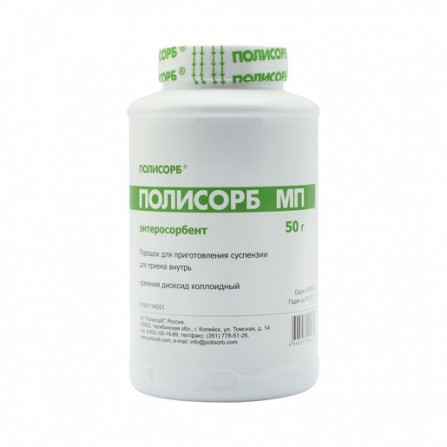Polysorb powder for suspension preparation of the bank 50g
Condition: New product
981 Items
Rating:
Be the first to write a review!

More info
Active ingredients
Colloidal silicon dioxide
Release form
Powder
Composition
Polysorb; MP - inorganic non-selective polyfunctional enterosorbent based on highly dispersed silica with particle sizes up to 0.09 mm and with the chemical formula SiO2. Polysorb; MP has pronounced sorption and detoxification properties. In the lumen of the gastrointestinal tract, the drug binds and removes from the body endogenous and exogenous toxic substances of various nature, including pathogenic bacteria and bacterial toxins, antigens, food allergens, drugs and poisons, heavy metal salts, radionuclides, and alcohol. Polysorb; MP also absorbs some metabolic products of the body, including an excess of bilirubin, urea, cholesterol and lipid complexes, as well as metabolites responsible for the development of endogenous toxicosis.
Pharmacological effect
Pharmacokinetics
Indications
After taking the drug Polysorb; MP inside the active substance is not split and is not absorbed in the digestive tract. Excreted from the body unchanged.
Contraindications
Polysorb; MP is taken orally only in the form of an aqueous suspension. To obtain a suspension, the required amount of the drug is thoroughly stirred in 1 / 4-1 / 2 cup of water. It is recommended to prepare a fresh suspension before each drug intake and drink it 1 hour before meals or other medications. Adults drug Polysorb; MP is prescribed in an average daily dose of 0.1-0.2 g / kg body weight (6-12 g). The multiplicity of reception - 3-4 times / day. The maximum daily dose in adults is 0.33 g / kg body weight (20 g). Single dose of the drug Polysorb; MP for children depends on body weight (see table). Daily dose = single dose × 3 times per day. 1 teaspoon with a slide - 1 g of the drug. 1 tablespoon with a hill - 2.5-3 g of the drug. In case of food allergies, the drug should be taken immediately before a meal. The daily dose is divided into 3 doses during the day. The duration of treatment depends on the diagnosis and the severity of the disease. The course of treatment for acute intoxication is 3-5 days; with allergic diseases and chronic intoxications - up to 10-14 days. After 2-3 weeks it is possible to repeat the course of treatment. Features of the drug Polysorb; MP in various diseases and conditions. In case of food poisoning and acute poisoning, therapy is recommended to start with gastric lavage with a 0.5-1% suspension of the drug Polysorb; MP In severe poisoning on the first day, gastric lavage is carried out through a tube every 4-6 hours, along with this, the drug is given orally.A single dose for adults is 0.1-0.15 g / kg of body weight of the patient 2-3 times / day. In acute intestinal infections, treatment with Polysorb; MPs recommend starting in the first hours or days of the disease as part of complex therapy. On the first day, the daily dose of the drug is taken for 5 hours with an interval between doses of 1 hour. On the second day, the frequency of taking the drug is 4 times / day. Duration of treatment is 3-5 days. In the treatment of viral hepatitis Polysorb; MP is used as a detoxification agent in an average daily dose during the first 7-10 days of illness. In case of acute allergic reactions (medicinal or food), it is recommended to pre-wash the stomach and intestines with a 0.5-1% suspension of the drug Polysorb; MP Further, the drug is prescribed in usual doses before the onset of clinical effect. In case of chronic food allergies, courses of therapy with Polysorb are recommended; MP lasting 7-10-15 days. The drug is taken immediately before meals. Similar courses are prescribed for acute recurrent urticaria, angioedema, eosinophilia, pollinosis and other atopic diseases. In chronic renal failure, treatment with the drug Polysorb is used; MP at a dose of 0.1-0.2 g / kg / day for 25-30 days with a break of 2-3 weeks.
Dosage and administration
- acute and chronic intoxications of various etiologies in children and adults — acute intestinal infections of various etiologies, including foodborne infections, as well as diarrheal syndrome of non-infectious origin, dysbacteriosis (as part of complex therapy) - purulent-septic diseases accompanied by severe intoxication — acute poisoning with potent and poisonous substances, including drugs and alcohol, alkaloids, heavy metal salts — food and drug allergies — hyperbilirubinemia (viral hepatitis and other jaundice) and hyperasotemia (chronic renal failure) —– to residents of environmentally unfriendly regions and workers in hazardous industries for the purpose of prevention.



